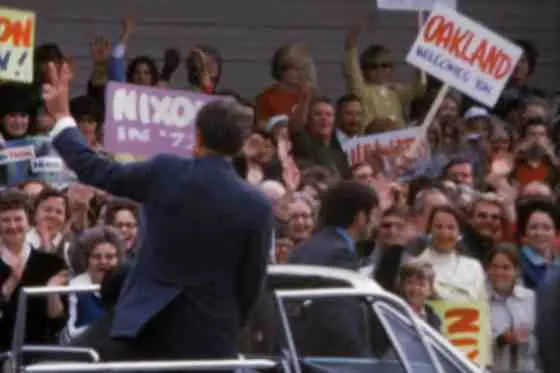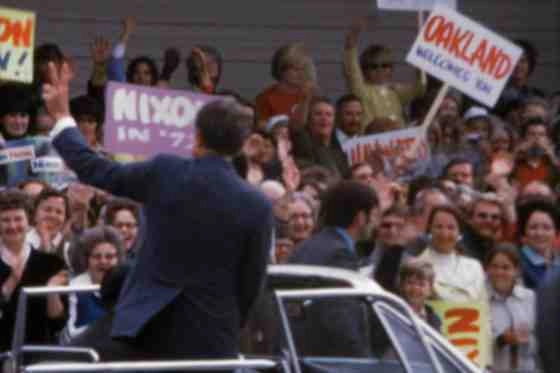Movies
SXSW Film Festival Day 3: Is The MPAA All Bad?
Our Nixon
Photo courtesy of Submarine Entertainment
I was able to attend my first panel discussion on my third day at SXSW. Cleverly titled “This Panel is Not Yet Rated,” the focus was on the rating system used by the Motion Picture Association of America and how — or if — it affects filmmakers’ artistic vision and audiences’ moviegoing experiences. The panel was moderated film critic Alyssa Rosenberg and the guests were Joan Graves from the MPAA; filmmaker Vincenzo Natali (Cube, Splice); producer/CEO of Snowfort Pictures, Travis Stevens; and film critic and self-described horror scholar Scott Weinberg.
My entire adult life, I have railed against the MPAA for what I believed was their archaic and restrictive ratings system that punishes filmmakers and unnecessarily censors cinema. After listening to Graves speak, however, I have to admit that my understanding of the MPAA’s function was incredibly limited. As she answered questions from her fellow panelists as well as the audience, it became clear that the MPAA acts in a much more reactive fashion than most people comprehend. The ratings determinations that are made are heavily influenced by the board of 12 parents that makes recommendations to the organization as well as the hundreds of phone calls and emails they receive each year. Graves explained how the MPAA tries to act as a cultural barometer and not a predictor of societal expectations.
I was expecting a rather heated debate between the panelists, but the conversation was quite civil and very enlightening. As a director who has made several films with shocking content (most notably Splice), Natali had a few questions about how sexual acts are judged. Weinberg discussed at length his concerns about gratuitous violence and its desensitizing effect on audiences, himself included. There was also an interesting recap about the history of the ratings system — from the Hayes Code to Jack Valenti’s creation of the MPAA — and the formation of the PG-13 category in the 1980s. So far, this has been one of the highlights of the festival for me.
I haven’t been able to see many documentaries thus far, but I was able (at the urging of my wife) to see Our Nixon which uses archival footage from Richard Nixon’s closest aides to explore the disgraced president’s administration and the paranoia and ego that led to the Watergate scandal. Directed by Penny Lane, the film is comprised solely of Super 8 footage (shot by Nixon staffers Dwight Chapin, H.R. Haldeman and John Ehrlichman) and television interviews that took place during Nixon’s presidency and after the Watergate trials concluded. The result is an almost unbelievable journey into the inner-workings of a presidency and the power and arrogance that comes with the position — something not unique to Nixon.
Lane gained access to the Super 8 footage after it had been classified for over 40 years. The records are indisputable since they were made by the players involved. Ironically, it was Nixon himself who demanded taped recordings of all his conversations with his top aides. Though Lane does add a few superfluous exchanges that serve only as further character attacks on Nixon, the film is excellent and will hopefully receive a wide release after the festival so mass audiences will have access to this important documentary.
The other film I was able to see on Day 3 was Burma from writer/director Carlos Puga. South By Southwest was the perfect venue for the world premiere of Puga’s film which deals with very serious issues that one family must face during a very important and emotional weekend. Christopher Abbott (HBO’s Girls, Hello, I Must Be Going) stars as a struggling writer whose estranged father appears on his doorstep. Dr. Lynn (Christopher McCann) abandoned his three children while his wife was on her death bed, but now he says he has an explanation. Christian and his two siblings — Susan (Gaby Hoffman) and Win (Dan Bittner) — are less than thrilled to have him back in their lives but then acquiesce and allow him to state his case.
Puga’s directing style is restricted and never intrudes on the very personal story that is being told. His script, however, is outstanding and contains some brilliant pieces of insight into the inner workings of family units and what it means to forgive. Abbott is proving himself to be a truly talented actor and gives yet another wonderful performance.
Tomorrow I will have an interview with Puga about his film’s inspiration and how he discovered his characters’ voices. I will also be covering Joseph Gordon-Levitt’s directorial debut, the recently retitled Don Jon.
Our Nixon: A
Burma: A
Matthew Newlin lives in St. Louis, Missouri and has been a film critic for over six years. He has written for numerous online media outlets, including “Playback:STL” and “The Weissman Report.” He holds a Master’s of Education in Higher Education from the University of Missouri-St. Louis and is an Assistant Director of Financial Aid. A lifelong student of cinema, his passion for film was inherited from his father who never said “No, you can’t watch that.”
Related
Matthew Newlin lives in St. Louis, Missouri and has been a film critic for over six years. He has written for numerous online media outlets, including "Playback:STL" and "The Weissman Report." He holds a Master's of Education in Higher Education from the University of Missouri-St. Louis and is an Assistant Director of Financial Aid. A lifelong student of cinema, his passion for film was inherited from his father who never said "No, you can't watch that."















You must be logged in to post a comment Login